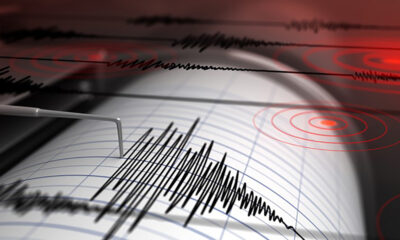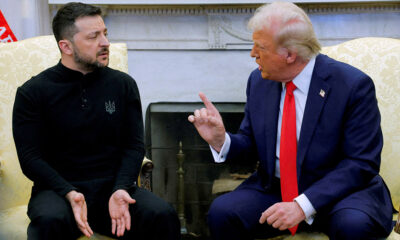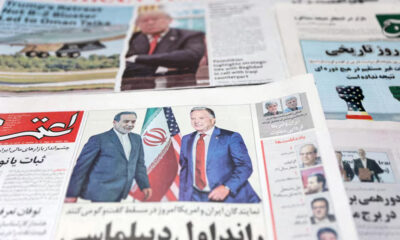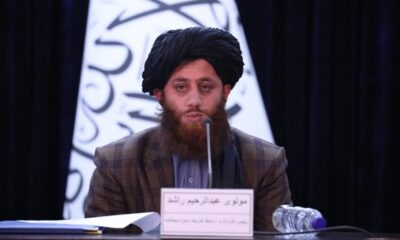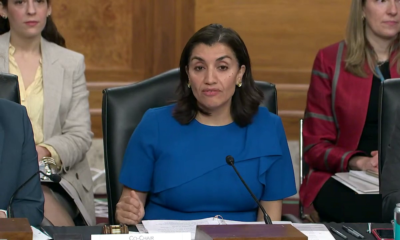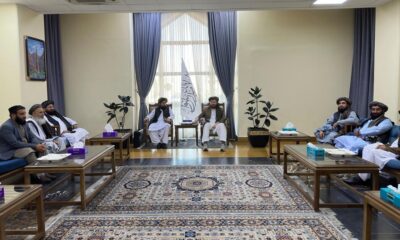Regional
Focus turns to quake aid, as rescues continue
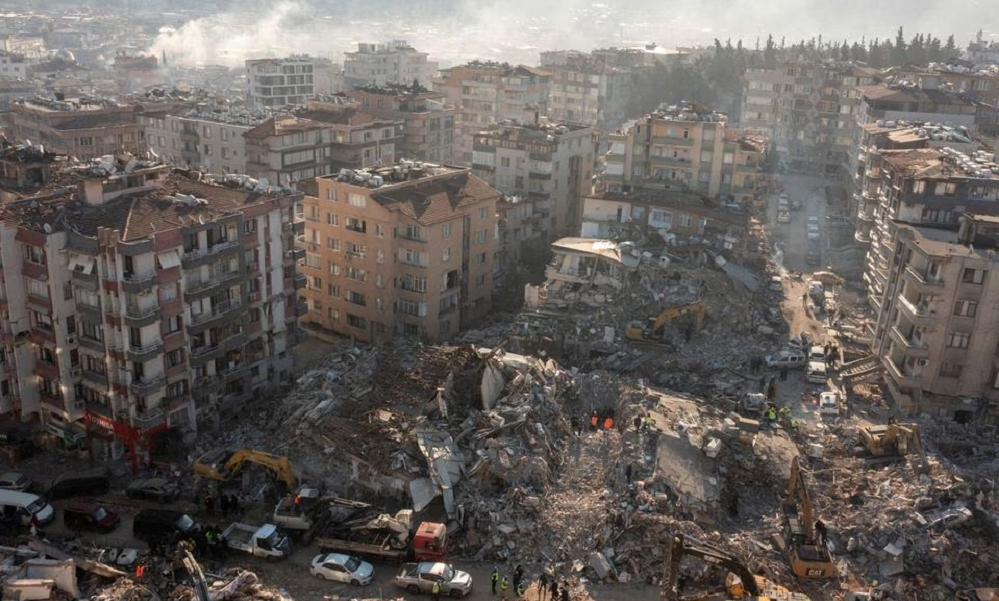
Emergency crews made a series of dramatic rescues in Turkey on Friday, pulling several people from the rubble four days after a catastrophic 7.8-magnitude earthquake killed more than 23,000 in Turkey and Syria.
Temperatures remain below freezing across the large region, and many people have no place to shelter.
The Turkish government has distributed millions of hot meals, as well as tents and blankets, but is still struggling to reach many people in need, Associated Press reported.
The United Nations has pledged a $25 million grant for people in earthquake-stricken areas of Syria. That’s in addition to a $25 million grant announced earlier this week for emergency operations in both Turkey and Syria.
U.N. humanitarian chief Martin Griffiths said Friday the new grant from the U.N. emergency fund would help meet the urgent needs of hundreds of thousands of Syrians.
U.N. spokesperson Stephane Dujarric said around 130 urban search-and-rescue teams from around the world are working in Turkey, and another 57 teams are on their way.
In response to Syrian critics who say the U.N. isn’t doing enough to help find victims, the spokesperson said the U.N. does not have its own search-and-rescue teams. Instead, it has a coordinating role through its disaster assessment teams.
A U.N. disaster assessment team is in Syria and deploying to government-controlled Aleppo, Homs and Latakia, Dujarric said. A second U.N. aid convoy entered Syria’s rebel-held enclave on Friday from Turkey, bringing shelter and non-food items.
Syria’s state news agency SANA says paramedics have succeeded in pulling a mother and her two adult children from under the rubble of a building in the coastal town of Jableh.
The three were immediately rushed away in ambulances late Friday, the fifth day after the earthquake that hit Turkey and northern Syria, killing more than 23,000 people.
Although experts say trapped people can live for a week or more, the chances of finding survivors are dimming. The rescues Friday in Syria and Turkey have provided fleeting moments of joy and relief amid the misery gripping the shattered region, where morgues and cemeteries are overwhelmed.
Turkish President Recep Tayyip Erdogan has described the powerful earthquake that ravaged parts of southeast Turkey as “one of the greatest disasters our nation has faced in its history.”
Touring the province of Adiyaman on Friday, Erdogan said search-and-rescue efforts would continue until no one is left trapped beneath the rubble.
He renewed a promise to rebuild the area within the year, and also said the government would subsidize rents for one year for people unwilling to stay in tents.
Regional
Iran, US hold ‘positive’ talks in Oman, agree to resume next week
Araqchi said his delegation had a brief encounter with its U.S. counterpart headed by Witkoff, after they exited the talks.
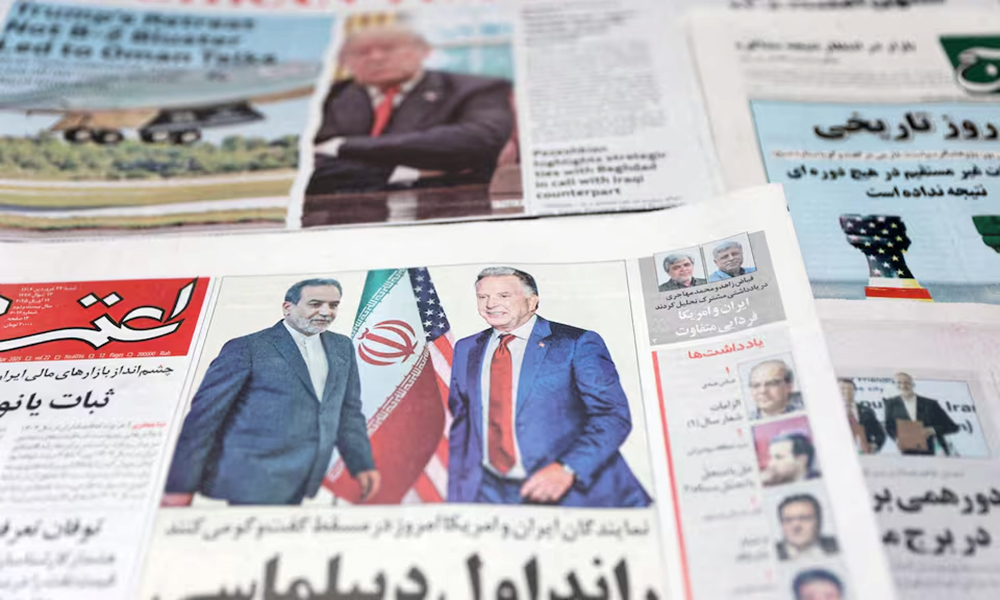
Iran and the U.S. said they held “positive” and “constructive” talks in Oman on Saturday and agreed to reconvene next week in a dialogue meant to address Tehran’s escalating nuclear programme, with President Donald Trump threatening military action if there is no deal, Reuters reported.
“I think we are very close to a basis for negotiations and if we can conclude this basis next week, we’ll have gone a long way and will be able to start real discussions based on that,” Iranian Foreign Minister Abbas Araqchi told state television.
Araqchi said the talks – the first between Iran and a Trump administration, including his 2017-2021 first term – took place in a “productive, calm and positive atmosphere”.
“Both sides have agreed to continue the talks … probably next Saturday,” Araqchi added. “Iran and the U.S. side want an agreement in the short term. We do not want talks for (the sake of) talks.”
The White House called the talks involving Trump’s Middle East envoy Steven Witkoff, U.S. Ambassador to Oman Ana Escrogima and Araqchi “very positive and constructive.”
“These issues are very complicated, and Special Envoy Witkoff’s direct communication today was a step forward in achieving a mutually beneficial outcome,” it said in a statement. “The sides agreed to meet again next Saturday.”
Asked about the talks, Trump told reporters on Saturday night: “I think they’re going OK.”
“Nothing matters until you get it done, so I don’t like talking about it, but it’s going OK. The Iran situation is going pretty good, I think,” he said on Air Force One.
Trump made a surprise announcement on Monday that Washington and Tehran would begin talks in Oman, a Gulf state that has mediated between the West and the Islamic Republic before. It has brokered the release of several foreign citizens and dual nationals held by Iran, read the report.
Saturday’s exchanges were indirect and mediated by Oman, as Iran had wanted, rather than face-to-face, as Trump had demanded. Each delegation had its separate room and exchanged messages via Oman’s foreign minister, according to Iranian Foreign Ministry spokesman Esmail Baghaei.
Araqchi said his delegation had a brief encounter with its U.S. counterpart headed by Witkoff, after they exited the talks.
“After the end of more than 2-1/2 hours of indirect talks, the heads of the Iranian and American delegations spoke for a few minutes in the presence of the Omani foreign minister as they left the talks. It (the encounter) was based on our political etiquette,” Araqchi said.
“The current focus of the talks will be de-escalating regional tensions, prisoner exchanges and limited agreements to ease sanctions (against Iran) in exchange for controlling Iran’s nuclear programme,” an Omani source told Reuters.
Baghaei denied this account but did not specify what was false.
Trump, who in his first term withdrew the U.S. from a 2015 big-power accord with Tehran, has again brought a tougher approach to a Middle Eastern power whose nuclear programme Washington’s ally Israel regards as an existential threat.
At the same time, Iran and allied groups have been weakened by the military offensives Israel has launched across the region, including air strikes in Iran, during its war with Hamas after the Palestinian militant group Hamas attacked Israel from Gaza in October 2023, Reuters reported.
Mikhail Ulyanov, Russia’s ambassador to international bodies in Vienna, called the statements issued by both sides after the talks “encouraging”.
Tehran approached the talks warily, sceptical they could yield a deal and suspicious of Trump, who has repeatedly threatened to bomb Iran if it does not halt its accelerating uranium enrichment programme – regarded by the West as a possible pathway to nuclear weapons.
While each side has talked up the chances of some progress, they remain far apart on a dispute that has rumbled on for more than two decades. Iran has long denied seeking nuclear weapons capability, but Western countries and Israel believe it is covertly trying to develop the means to build an atomic bomb.
“This is a beginning. So it is normal at this stage for the two sides to present to each other their fundamental positions through the Omani intermediary,” Baghaei said.
Signs of progress could help cool tensions in a region aflame since 2023 with wars in Gaza and Lebanon, missile fire between Iran and Israel, Houthi attacks on Red Sea shipping and the overthrow of the government in Syria.
However, failure would aggravate fears of a wider conflagration across a region that exports much of the world’s oil. Tehran has cautioned neighbouring countries that have U.S. bases that they would face “severe consequences” if they were involved in any U.S. military attack on the OPEC member.
“There is a chance for initial understanding on further negotiations if the other party (U.S.) enters the talks with an equal stance,” Araqchi told Iranian TV.
Iran’s Supreme Leader Ayatollah Ali Khamenei, who has the final say on key state matters, has given Araqchi “full authority” for the talks, an Iranian official told Reuters.
Iran has ruled out negotiating its defence capabilities such as its ballistic missile programme.
Western nations say Iran’s enrichment of uranium, a nuclear fuel source, has gone far beyond the requirements of a civilian energy programme and has produced stocks at a level of fissile purity close to those required in warheads.
Trump, who has restored a “maximum pressure” campaign on Tehran since February, ditched a 2015 nuclear pact between Iran and six world powers, including Russia and China, in 2018 during his first term and reimposed crippling sanctions on the Islamic Republic.
Since then, Iran’s nuclear programme has leaped forward, including by enriching uranium to 60% fissile purity, a technical step from the levels needed for a bomb.
Regional
South Korea establishes diplomatic ties with Syria
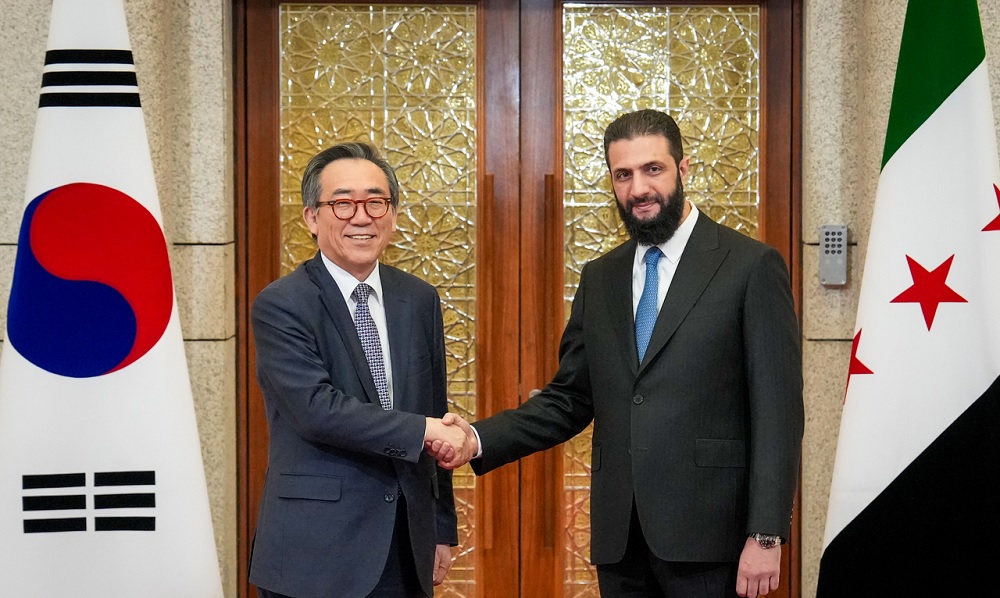
South Korea and Syria have signed an agreement in Damascus establishing diplomatic relations, the South Korean foreign ministry said on Friday, opening new ties with a traditional ally of its rival North Korea.
The event marks a milestone for South Korea now having established diplomatic ties with all 191 U.N. member states and opening “a new chapter for bilateral cooperation with Syria, which had long remained distant due to its close ties with North Korea,” the South Korean foreign ministry said, Reuters reported.
South Korea established diplomatic relations with Cuba last year, another old ally of the North.
North Korea’s state media ceased mentions of Syria since the overthrow of former President Bashar al-Assad in December except leader Kim Jong Un once referring to “the Middle East crisis” in passing.
A joint communique was signed by South Korean Foreign Minister Cho Tae-yul and Syria’s Asaad al-Shibani on Thursday, and Cho expressed willingness to share South Korea’s development experience to support Syria’s reconstruction, the ministry said.
Cho later met Syrian President Ahmed al-Sharaa, it said.
Regional
Anxious Iranians hope nuclear talks may ease risk of US attack
Many people in Iran to whom Reuters spoke by phone remained pessimistic about the future.
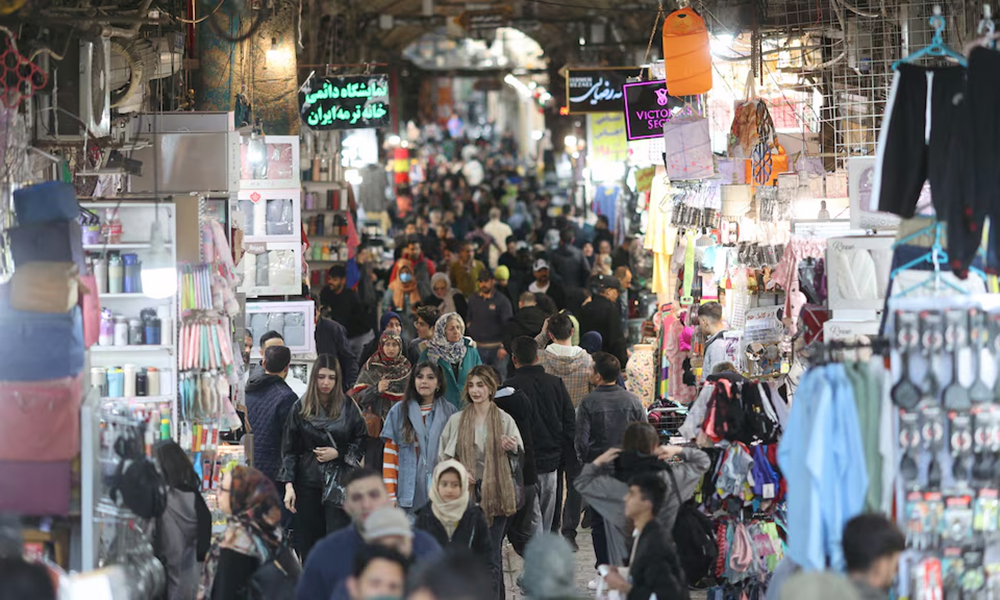
Weary from long years of biting sanctions and worried about U.S. threats of military action, Iranians have responded to the prospect of talks this weekend with expressions of hope that have boosted their stock market and depressed currency, Reuters reported.
The U.S.-Iranian talks in Oman are to address the long dispute between Iran and the West over its nuclear programme, though Iranian officials are sceptical of progress and U.S. President Donald Trump has repeatedly threatened to bomb if no deal is reached.
Many people in Iran to whom Reuters spoke by phone remained pessimistic about the future. But even the slim chance of a deal with an unpredictable U.S. president who has often boasted of his negotiating skills has given some people a little optimism.
Trump announced the talks on Monday. By Wednesday Iran’s rial currency, which had sunk to a record low of 1,050,000 to the dollar and whose value often tracks Iran’s geopolitical shifts, had strengthened slightly to 999,000 to the dollar.
Tehran’s stock exchange rose by 2.16% on Tuesday, its best performance since January, as investors shifted from safe havens in gold and foreign currency to domestic shares. The market had risen by another 1.1% in early trading on Wednesday.
Iran has had tense relations with Western powers and other major countries for much of the decades since its 1979 Islamic Revolution, particularly since 2003 when the dispute over its uranium enrichment programme moved to centre stage, read the report.
“For years, we have suffered over this dispute. It is time to end this standoff. We want to live a normal life with no hostilities and particularly no economic pressure,” said Amir Hamidian, a retired government employee in Tehran.
“I don’t want my country to be bombed … Life is already too expensive. My purchasing power is shrinking every day,” said the father of three, whose monthly salary equates to about $120.
Despite their tough rhetoric, the Islamic Republic’s clerical establishment feels compelled to agree to talks because of fears that anger over the deteriorating economy could spark protests, four Iranian officials told Reuters in March.
Economists believe that sanctions relief could lower import costs and boost export prices for Iranian firms, but wary investors are sticking to short-term bets amid doubt over the outcome of the talks scheduled for Saturday.
Many ordinary Iranians, who have seen repeated fruitless efforts to resolve the government’s standoff with the West, voiced little faith in the outcome of the discussions, Reuters reported.
Minou, a 32-year-old housewife and mother of two in the central city of Isfahan, was pessimistic.
“There will be no deal. There is a huge gap between the sides. Trump is going to bomb us. What should we do? Where should we go? I have withdrawn all my savings from the bank to have cash at home if the U.S. or Israel attack Iran,” she said.
Trump has signalled the renewal of his “maximum pressure” approach to Tehran, which during his first term in 2017-21 helped crash Iran’s economy with sanctions on its oil exports though it has also found ways to evade the embargo.
President Masoud Pezeshkian has repeatedly said the sanctions have made Iran’s economic problems more challenging even than during the Iran-Iraq war in the 1980s.
“I am worried to death. Enough is enough. Just reach a deal and end our misery,” said Mahsa, 22, a university student in the northern city of Sari.
Since 2017, Iranians have staged periodic nationwide demonstrations over poor living standards, calling for “regime change”.
But some hardliners are putting their faith in Supreme Leader Ayatollah Ali Khamenei, who – in the Islamic Republic’s complex power structure – has the final say on matters of state.
“Our Supreme Leader is fully aware of the situation and he will lead us out of trouble. Whatever he decides, we will support it,” said Mohammad Amin Hosseini, 27, from the northeastern city of Mashhad.
-

 Latest News5 days ago
Latest News5 days agoItaly to welcome 700 Afghan refugees for resettlement
-

 Sport5 days ago
Sport5 days agoAfghanistan’s national futsal team heads to Morocco
-
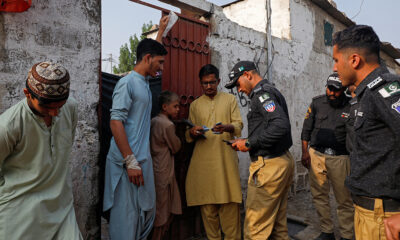
 Latest News5 days ago
Latest News5 days agoMinistry of Refugees slams neighboring countries for mistreatment and forced removals of Afghans
-
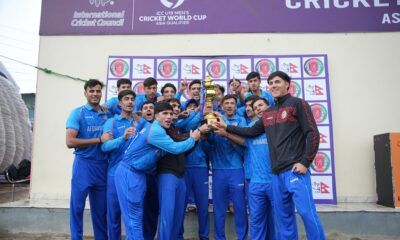
 Sport4 days ago
Sport4 days agoAfghanistan win U-19 cricket series despite rain-impacted loss to Nepal
-
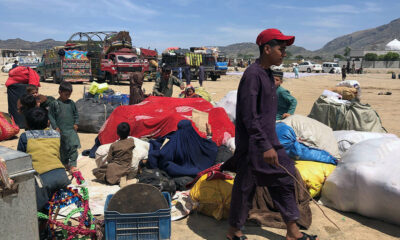
 Latest News4 days ago
Latest News4 days agoPakistan expels thousands of Afghan nationals in fresh drive, says UNHCR
-
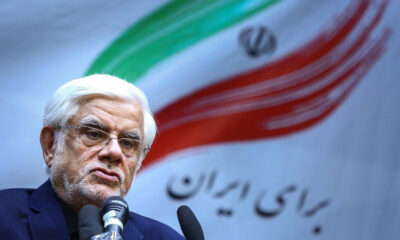
 Latest News4 days ago
Latest News4 days agoIran’s Vice President advocates stronger ties with neighbors, especially Afghanistan
-
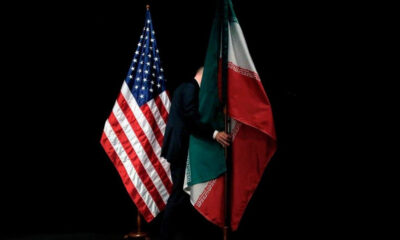
 Regional4 days ago
Regional4 days agoUS energy secretary sees tighter sanctions on Iran without deal
-
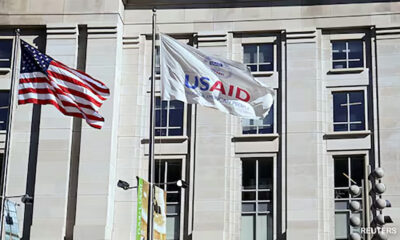
 Latest News4 days ago
Latest News4 days agoTrump administration moves to restore some terminated foreign aid programs, sources say


